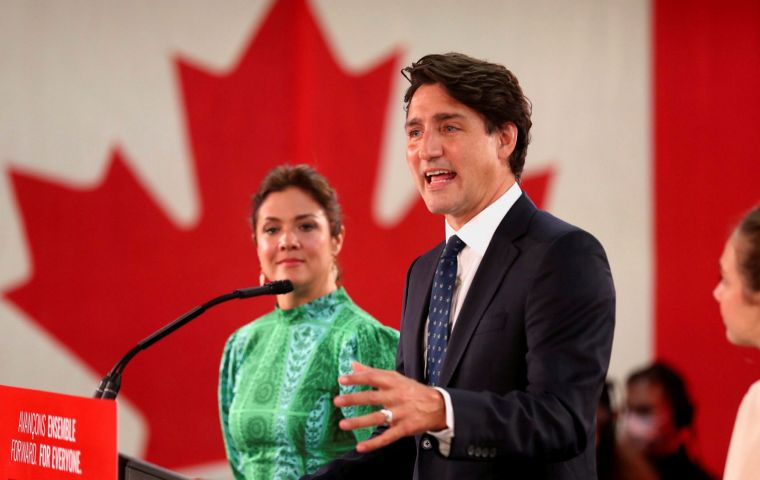MercoPress. South Atlantic News Agency
Trudeau poised to remain Canada’s Prime Minister but still without Congressional majority
 No major changes ahead after Monday's elections in Canada
No major changes ahead after Monday's elections in Canada Monday's elections in Canada seem to allow Prime Minister Justin Trudeau to form a new government after securing the most seats, albeit without the Congressional majority he coveted.
Monday's outcome nearly mirrored the result of two years ago. More than 1.2 million voters chose to cast their choices by mail or special ballot, likely delaying the full outcome.
Trudeau’s Liberal Party appeared to be headed for minority status yet again, which will force it to continue to rely on the support of the left-leaning New Democratic Party (NDP) to hold power. Trudeau’s Liberals were leading or elected in 156 seats — one less than in 2019, and 14 short of the 170 needed for a majority in the House of Commons.
With Monday's preliminary results, the House would remain virtually unchanged. The Liberals were leading in 156 ridings, the Conservatives in 121, the Quebec-based Bloc Québécois in 32, the NDP in 27 and the Greens in two.
Trudeau entered the election leading a stable minority government that was not under threat of being toppled. The incumbent Prime Minister had started the campaign last month with a clear lead in the polls, but he wound up in a narrow race with Conservative candidate Erin O’Toole.
The 49-year-old Trudeau delivered a calm speech after his third election victory before some 250 supporters at the Liberal headquarters in Montreal, their numbers restricted by pandemic rules. Despite minority status, he called it a “clear mandate to end this pandemic once and for all”.
Meanwhile, O’Toole downplayed his party's defeat: “Mr Trudeau was hoping for a quick power grab. Instead, he has thrust us … into 18 months of perpetual campaigning,” he said about Trudeau’s hint that he might seek another election in 2023 if denied a majority. “If he thinks he can threaten Canadians with another election in 18 months, the conservatives will be ready,” added the 47-year-old military veteran, lawyer and a member of Parliament for nine years.
It is six years since Trudeau, son of former prime minister Pierre Trudeau, swept to power. But his ruling Liberal Party was reduced to minority status in 2019, supported by the NDP, which is led by Jagmeet Singh.
Although Canada is in the midst of a fourth wave of the pandemic, the country has one of the world’s best vaccination rates. About 80 per cent of Canadians aged 12 and up are fully vaccinated, representing 70 per cent of the entire population. Trudeau had argued that the Conservatives’ approach, which has been sceptical of lockdowns and vaccine mandates, would be dangerous and says Canadians need a government that follows science.
The opposition was relentless in accusing Trudeau of calling an unnecessary early vote — two years before the deadline — for his ambition.
O’Toole did not require his party’s candidates to be vaccinated and would not say how many were unvaccinated. O’Toole described vaccination as a personal health decision, but a growing number of vaccinated Canadians are increasingly upset with those who refuse to get vaccinated.
Trudeau supports making vaccines mandatory for Canadians to travel by air or rail, something the Conservatives oppose.
Former US President Barack Obama and ex-Democratic Party nominee Hillary Clinton had tweeted in support of Trudeau.




Top Comments
Disclaimer & comment rulesCommenting for this story is now closed.
If you have a Facebook account, become a fan and comment on our Facebook Page!